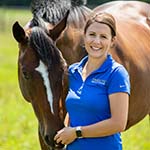Just like in humans, choke in horses is a serious issue; however, because of the difference in anatomy between horses and humans, choke presents differently in horses. When a person is choking, there is something that is obstructing their airway, but in horses, the airway remains clear while the esophagus, the tube that runs from the mouth to stomach, is blocked.
While a horse is choking, they remain able to breathe, making it a less dire situation, but choke is still a serious problem.
How Can I Tell if a Horse Is Choking?
In horses, choke occurs when a slug of feed material becomes caught in the esophagus.
Signs a horse is choking:
- Retching
- Coughing
- Large volume of saliva
- Feed material coming out of nostrils
- Distressed appearance
- Sweating
Horses can choke on any feed material including grass, hay or horse feeds. You are most likely to notice your horse choking on a horse feed because you will be in the barn during feeding time. In some cases, horses will be able to clear a minor choke just by coughing, but more serious cases will require vet intervention.
How to Treat a Horse That Is Choking?
Many times, horses will quickly clear a choke by coughing. However, if your horse does not clear the choke on their own in a short period of time, is showing greater distress, or you see feed material coming from the nostrils, you will need help from your veterinarian.
While waiting for your vet to arrive, keep your horse as calm as possible and remove sources of feed and water. Your vet may suggest you lightly massage the left side of the neck over the jugular groove to try to break up the obstruction. Do not attempt to pass anything down your horse’s throat.
The treatment for choke by your veterinarian will vary case by case, but the general approach is to combine the use of sedation to relax the muscles around the blockage and the use of a nasogastric tube to physically clear the obstruction.
If your vet suspects your horse aspirated (inhaled) any feed particles into their lungs, they will prescribe antibiotics. It is good practice to monitor the horse’s temperature twice a day for several days after even a minor choke incidence. A spike in temperature will be the first sign of pneumonia.
How to Feed a Horse After a Choke Episode
After an episode of choke, the horse will need to be closely monitored. The two main complications are the irritation and swelling of the esophagus and the risk of developing pneumonia due to the aspiration of feed particles into the lungs while the horse is choking. Your veterinarian may prescribe medications to address these potential complications.
Slow reintroduction of feed is recommended after a choke episode, with a focus on small quantities that are easy for the horse to swallow. Oftentimes, horse feed will not be reintroduced for several days and will be offered in a soupy mash at first.
Why Do Horses Choke?
The fundamental reason a horse will choke on a horse feed (or other feedstuff), initially, is that the horse does not chew the feed properly and therefore, it doesn’t have enough saliva produced to allow the feed to slide smoothly down the esophagus.
The two primary reasons a horse does not chew their feed sufficiently are rapid feed consumption, often called bolting, and dental issues.
Horses will bolt their feed due to a variety of reasons, many of which are due to feeling anxious at feeding time due to real or perceived competition for feed. For this reason, horses are more likely to choke when fed in groups. Even when horses are fed individually, a horse showing feed aggression on the opposite side of a partition may cause a horse to bolt their feed.
An examination of the horse’s mouth after a choke incident is a good practice, even if they have had a recent float. There are a number of issues that can create mouth pain that lead to improper chewing. The condition of the horse’s mouth is best observed under sedation with use of a speculum.
In rarer cases, horses may have issues swallowing or will have developed scar tissue or an obstruction in the esophagus. Your veterinarian can explore these causes by scoping.
Long Term Management of a Horse That has Previously Choked
Once a horse has a history of previous choke episodes, they may develop scar tissue due to the swelling and irritation of the esophagus. The presence of scar tissue increases the risk that a horse will experience choke again. The horse can be scoped to determine the extent of scar tissue present, which can help in determining an appropriate feeding management strategy going forward.
Some general advice to reduce the likelihood of choke are frequent dental exams and removing feed competition, real or perceived. For horses in the habit of bolting their feed regardless of management changes, you can implement strategies to slow down their consumption. Feeding horse feed meals as a very soupy mash or adding large smooth stones or salt licks to feed pan are two options. Sometimes, a change in feed texture can be helpful as well, either from a pellet to a textured feed or choosing a pelleted feed with a softer consistency.
If you have questions about your horse’s diet, please reach out to us for a free, personalized feeding plan.

